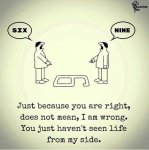Cfscott
Member
- Joined
- May 12, 2011
- Messages
- 112
- Reaction score
- 63
- Location
- Houston, TX
- Gender
- Male
- Political Leaning
- Conservative
This is a excerpt from a TED talk by Arthur Brooks. I was really struck by the talk and particularly section below:

Now, I don't have to tell anybody in this room that we're in a crisis, in America and many countries around the world with political polarization. It's risen to critical, crisis levels. It's unpleasant. It's not right. There was an article last year in the Proceedings of the National Academy of Sciences, which is one of the most prestigious scientific journals published in the West. And it was an article in 2014 on political motive asymmetry. What's that? That's what psychologists call the phenomenon of assuming that your ideology is based in love but your opponents' ideology is based in hate. It's common in world conflict.You expect to see this between Palestinians and Israelis, for example. What the authors of this article found was that in America today, a majority of Republicans and Democrats suffer from political motive asymmetry. A majority of people in our country today who are politically active believe that they are motivated by love but the other side is motivated by hate. Think about it. Think about it. Most people are walking around saying, "You know, my ideology is based on basic benevolence, I want to help people,but the other guys, they're evil and out to get me." You can't progress as a society when you have this kind of asymmetry. It's impossible."
I think it is a valid point. In politics today, it seems like each side has written off and demonized the other. Mitt Romney's 47% and Hillary Clinton's basket full of deplorables being two good examples. It seems like we are heading down a path that the only "acceptable" solution is the total defeat and banishment of the "other" - no matter which side of the political spectrum you are coming from. The self selection bias in social media, news and association seems to be dividing us as never before. Identity politics seems to pull us apart. I am interested in knowing if you see this a key part of the problems facing us today or not. How can be bridge the divide? Should we even try? I love this picture below. Looking forward to the discussion.

